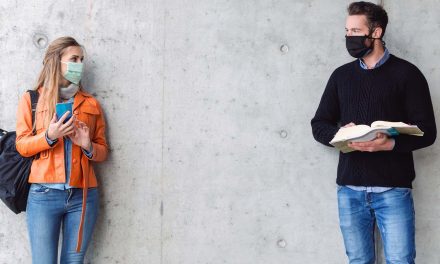
Kenneth Wade said he has always valued his health. He eats healthy foods. He works out. He drinks plenty of water. In 2015, when some of his friends told him about a pill called PrEP that could prevent him from getting HIV, he said he felt that learning more about it was a natural and important step to taking good care of himself.
At 27, Wade is a new brand ambassador for the AIDS Resource Center of Wisconsin’s awareness campaign “Stay PrEP’d Up,” which seeks to educate Milwaukeeans about the benefits of the medication and break down any stigmas about it.
“My sexual health is part of my health,” Wade said. “I asked my doctor my questions about it, and within a week I was on PrEP.”
PrEP stands for pre-exposure prophylaxis. It’s a daily prescription pill that can significantly reduce a person’s risk of contracting HIV, a virus that damages a person’s immune system, makes it harder to fight off infections and can lead to AIDS. When taken consistently, PrEP can reduce someone’s chance of getting HIV through sex by more than 90% and of getting HIV through needles by more than 70%, according to the Centers for Disease Control and Prevention.
After years of substantial declines, rates of HIV diagnoses have stagnated in recent years. Research from the Centers for Disease Control and Prevention suggests that this is because prevention options like PrEP are being severely underutilized.
“PrEP is the fast lane to the end of the AIDS epidemic, as long as we can make sure the people who need access to it are getting it,” said Mike Gifford, president and chief executive officer of the AIDS Resource Center of Wisconsin.
HIV disparities persist
In cities like Milwaukee, there are huge disparities in who is impacted by HIV, along with who accesses PrEP. African American gay and bisexual men are more affected by HIV than any other group, with Latino gay and bisexual men being the second most impacted group, according to the Centers for Disease Control and Prevention.
In 2017, 83% of the 118 new HIV diagnoses in Milwaukee were among people of color, according to the AIDS Resource Center of Wisconsin. Research from the Medical College of Wisconsin indicated that African American men are diagnosed with HIV at rates four times higher than white men.
Meanwhile, the Centers for Disease Control and Prevention reported that only 1.4% of African Americans and 2.5% of Latinos who could have potentially benefitted from PrEP were prescribed it.
“If we don’t find ways to increase PrEP use to young people of color, we’re going to continue to see those disparities,” said Katherine Quinn, assistant professor at the Medical College of Wisconsin’s Center for AIDS Intervention Research.
PrEP is a good option for people who are HIV-negative but who face a higher risk of getting HIV, Quinn said. Factors that may heighten a person’s risk of getting HIV are having sex with someone who is HIV-positive, having sex within a social network where HIV is more common, having had sex without condoms, having multiple sexual partners or exchanging sex for drugs, food, money or a place to live, according to the Stay PrEP’d Up website.
Wade said he was initially hesitant about taking PrEP because he wasn’t sure if his insurance would cover it. But after doing some research, he learned that his clinic could make it affordable.
“I have found it very easy for me to get treatment,” Wade said, “It’s really just about being safe and protected.”
Besides possible financial barriers, Wade said he has heard about stereotypes or misunderstandings that have made some of his peers skeptical of PrEP. For example, he said some people thought that the PrEP pill was for people who were HIV-positive, and that people would judge them if they took it.
Changing the narrative
Quinn studies how different stigmas may influence a person’s knowledge about or use of PrEP. Quinn also said that in some circles, PrEP is associated with a misconception that people who take it are promiscuous.
“Past experiences of perceived racism or homophobia from a healthcare provider makes it hard for people to get to the doctor,” she Quinn. “The narrative we have around PrEP is that it’s only for people who are irresponsible or who are having high-risk sex. We need to shift that to be an empowering way that people can protect themselves from HIV.”
Tiffany Wynn, marketing director for the AIDS Resource Center of Wisconsin, said that’s the point of the Stay PrEP’d Up awareness campaign.
“Taking PrEP just means you are concerned about your health and therefore you are trying to keep yourself healthy,” Quinn added.
Imani Sloan, PrEP program coordinator for the AIDS Resource Center of Wisconsin, said “in a time when there aren’t many messages for black and brown LGBTQ individuals that talk about the value and worth of their own bodies and who they are as people,” the campaign also is about instilling that sense of value and worth. She said taking PrEP is an act of self- love.
Derrick Langford is a PrEP navigator for the AIDS Resource Center of Wisconsin and is one of the more than 3,000 people living with HIV in Milwaukee. He said he wishes that he knew about PrEP earlier and is working to connect other people to services and healthcare they need to stay protected.
“There definitely are barriers to taking PrEP, but what we want to do is push past those barriers to make sure people feel loved and included,” he said. “I hope that people do feel worthy enough to protect themselves.”
To learn more about PrEP, visit stayprepdup.com or call 1-800-359-9272. These clinics and resources also offer PrEP services in Milwaukee.
Allison Dikanovic
Allison Dikanovic














